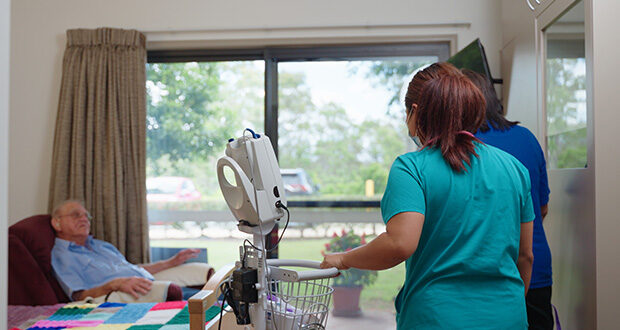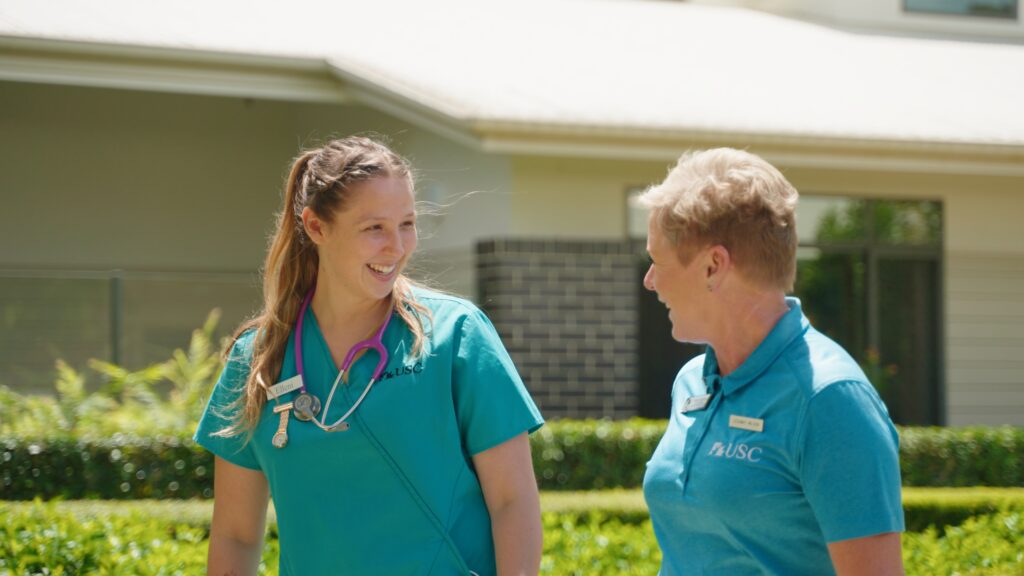A new placement program run by a regional university and aged care provider to attract nurses to the aged care sector is gaining momentum.
The UniSC and Lutheran Services expanded their 'Transition to Practise Program' to 28 places across three facilities on the back of the pilot's success earlier this year.
UniSC's senior nursing lecturer and aged care expert, John Rosenberg, said nurses doing their final placement in aged care made them more likely to stay in the sector.
"We know is that students' decision about where to work after graduation is strongly influenced by where they do their final placement," Rosenberg said.
"Most third-year graduate nurses don't pick aged care, even though it can be such an exciting career path."
He said most nursing schools in Australia would select aged care for its students' first placements.
The idea is that aged care exposes them to the basic skills of nursing care and personal care, Rosenberg said.
"There's this perception in nursing that aged care is easier to practise than other areas.
"Yet, if you look at who is receiving care – these are people with chronic medical conditions and cognitive challenges like dementia.
"It's clinically complex; it's workload challenging. It's a really different environment to acute care."
The program prepares newly qualified registered and enrolled nurses for entering the aged care workforce by providing specialised training and mentorship over eight weeks.
Rosenberg said the pilot was 'a great success' – two of the five student nurses selected for the program were hired by Lutheran services.
Another one moved interstate to work in older people's rehabilitation.
"We have one starting in July and another in November," Rosenberg said.
"We've also received interest from four other aged care providers likely to join soon."
Last November, the Aged and Community Care Providers Association (ACCPA) launched a similar program, recruiting over 75 undergraduate nurses for a six-month placement in the sector.
They started enrolling a new round of graduate nurses earlier in February and expected to open up more places by August 2023.
Rosenberg said they'd received 50 enquiries for the 14 places available for this year's first round.
They recently placed 13 student nurses across three Lutheran Services facilities.
"Lutheran Services has embraced this program so enthusiastically," Rosenberg said.
"They've had a chance over eight weeks to work closely with the nurses, assess their suitability as potential employees, and get to know them personally."
Lutheran Services has 20 aged care services sites in Queensland, of which 11 residential facilities.
Their Gympie-based facility, Cooinda Aged Care, was the first home to welcome the five student nurses during the pilot.
Cooinda Aged Care service manager, Gill Hyett, said it was a one-of-a-kind experience for nursing students to gain practical, hands-on learning that fast tracks a career in aged care.
"The program is already making in-roads to address staff shortages," Hyett told Aged Care Insite.
"After the successful pilot, we are expanding the program to three of our aged care sites this year, with 14 students selected for the program."
One of the nurses now working at Cooinda is Wendy Williams, who said she was glad she chose aged care as her final placement instead of a clinical hospital setting.
"Aged care, in particular palliative care, was a career goal when I began my studies," Williams said.
"It requires a lot of critical thinking to combine your practices and education to work out the optimal care for residents with complex needs, which is hugely rewarding.
"The placement was so valuable – and securing a job at the end with Lutheran Services was icing on the cake."
Lutheran Services chief Nick Ryan said that collaboration between universities and aged care facilities helped address the workforce shortage.
"Innovative partnerships between universities and industry are the key to unlocking potential opportunities and helping to future-proof Australia's aged care workforce," he said.
"It's a great way of harnessing the passion of our up-and-coming nursing students and providing an easier pathway into such a rewarding area as aged care."
Earlier this week, Aged Care Insite spoke with rural and remote aged care homes that struggled to find enough staff to meet the 24/7 nursing mandate set in July 2023.
Federal data estimated that the sector would need to plug a gap of 11,800 registered nurses by the next financial year to meet the new requirement.
However, on Tuesday, the health department conceded that it would miss the self-imposed deadline due to the nationwide lack of registered nurses.
It's estimated that one in 20 facilities will not meet the nursing requirements by this winter.
Rosenberg said he fully understood the concern it posed for aged care providers as a regional university representative.
"It's not just about whether or not we've got the numbers, but where those numbers are going to come from," he said.
"We wanted to help address, in some small wave, the workforce challenges we faced."
During the conversation with Aged Care Insite, Rosenberg was working through the student evaluations and looking back at the interviews with the nurses.
He said most students told him they were interested in complex clinical care.
Some had interests in dementia or chronic diseases, and others in wound management or end-of-life care, Rosenberg said.
"The sector offers various types of care that could answer a nurse's specific interest."
Nearly all students told Rosenberg that working in aged care was very different because of the location where care was delivered.
"They said, 'residential aged care is their home, and we are their guests.'
"It changes how you provide care – rather than making your rounds across hospital patients; you visit people where they live.
"It's that shift in whose space this is and that sense of supporting people living at a place that'll likely be their final stop.
"That has to change the kind of the heart of nursing."
Do you have an idea for a story?Email [email protected]
 Aged Care Insite Australia's number one aged care news source
Aged Care Insite Australia's number one aged care news source


